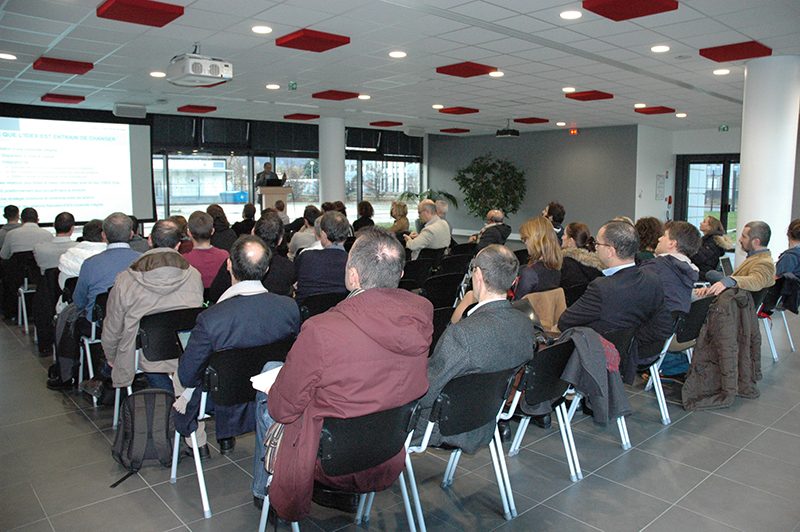
The December 11 IRT Nanoelec Meeting (“IRT Nanoelec and IDEX Grenoble-Alpes, working together”) gave IRT Nanoelec and IDEX Grenoble-Alpes stakeholders a chance to discuss common R&D topics and more.
The meeting began with a brief overview of IDEX.
Grenoble has built a solid reputation for excellence in science, technology, and innovation. The city’s exemplary cooperation between institutions of higher education, research organizations, government, and businesses helped Grenoble-Alpes University become one of the ten campuses in France to earn the government’s IDEX (“initiatives of excellence”) seal.
The IDEX project will help the university overcome two challenges. The first is to achieve greater integration. Currently, joint academic and research projects in Grenoble are organized by the “University Community,” a local organization that offers common services. The second is to raise the bar in terms of excellence in research, technology transfer, academics, international programs, campus life, and arts and culture.
This more integrated, multidisciplinary institution will support the social sciences and humanities, which will play a crucial role in addressing the scientific and societal challenges of the 21st century. It will also support programs to address four major socioeconomic challenges at the intersection of Grenoble’s existing strengths (a sustainable planet and society; health, wellness, and technology; understanding and supporting cultural, technological, and organizational innovation; and digital technology for people and society).
Presentations of specific programs were then given.
In the field of information and communication technologies, IRT Nanoelec has a program (PULSE) that develops and transfers micro and nanoelectronics technology directly for and to the companies (especially smaller companies) that need it to develop trustworthy digital products and services, regardless of their industry.
The Grenoble-Alpes University Cyber Security Institute conducts innovative cross-disciplinary research to effectively respond to challenges related to cybersecurity and privacy.
IRT Nanoelec and IDEX Grenoble-Alpes hold seats on each other’s boards and have expressed a desire to work together on actual programs.
A presentation focusing on human resources development then followed.
IDEX Grenoble-Alpes and IRT Nanoelec both have substantial education and training programs.
IRT Nanoelec helps develop course content to develop the human resources that will be needed to create and disseminate new knowledge in nanoelectronics in the future.
IDEX Grenoble-Alpes and IRT Nanoelec training and education stakeholders are in the process of building relationships with the goals of avoiding overlap and generating synergies for greater efficiency and performance.
The meeting ended with a presentation on new areas for cooperation between the two organizations.
The scope of cooperation between IDEX Grenoble-Alpes and IRT Nanoelec is expanding and new topics are currently being explored, including potential bridges between IRT Nanoelec programs and the IDEX “Need for IoT” initiative, which is developing research methods and advanced technology demonstrators for connected devices and their components and assessing the economic feasibility (including acceptability and sustainability) of potential IoT solutions. In the longer term, there could be opportunities for cooperation between IRT Nanoelec and the QuEnG project, which will create an ecosystem for the quantum technologies that will connect the sciences, the humanities, and entrepreneurship.
The conclusion of the meeting was essentially that IDEX Grenoble-Alpes and IRT Nanoelec are two relatively new organizations backed by the French government’s economic stimulus package and instruments to support knowledge creation, technology transfer, and socioeconomic development. The organizations will ramp up cooperation out of need and, above all, in the common interest of all of their stakeholders in true Grenoble tradition.




